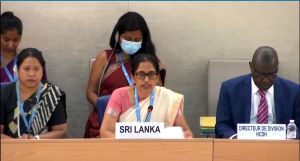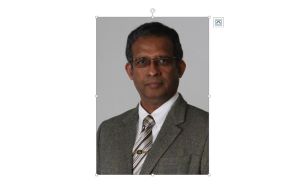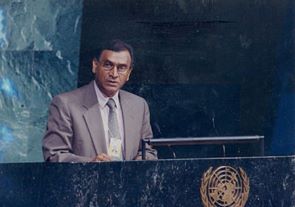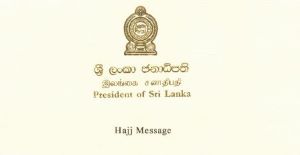
Mr. President
Excellencies
Distinguished Delegates
It gives me great pleasure to present to you the final position of the Government of Sri Lanka on the recommendations received during the 4th cycle of our UPR Report.
The mechanism of the UPR marks the culmination of a long review process of the international human rights machinery. We value the fact that this mechanism provides an equal opportunity for all UN member States, without discrimination, to voluntarily share the progress made domestically to promote and protect human rights. This peer review process has contributed to reducing selectivity and politicization in our efforts to advance the cause of human rights. It enables constructive engagement on developments related to human rights with our international partners, national independent institutions, civil society, and the UN system.
In these challenging times, as we strive for a future filled with renewed hope, the advent of the Hajj festival this year is of extreme significance.
The sacred festival of Hajj, embodies values and fulfilment derived from engaging in humanitarian endeavours, seeking solutions for the impoverished, without the expectation of respite from one’s own difficulties. It is a testament of the spirit of selflessness and compassion.
Prophet Ibrahim, his son Prophet Ishmael, and Mother Hagar stand as timeless symbols of dedication and sacrifice. For centuries, they have been revered universally, with their sacrifices being a source of gratitude and admiration.

Sri Lanka’s candidate Ambassador Prasad Kariyawasam was elected to the UN Committee on the Protection of the Rights of All Migrant Workers and Members of Their Families at the election held on 27 June 2023 at the United Nations in New York.
Ambassador Kariyawasam is a retired career diplomat and has previously served in the Committee three times, during which he was also the Chairperson during the Committee’s initial formative stages.

Mr. President,
The Government of Sri Lanka is addressing the unprecedented social and economic issues arising from the economic crisis. Political stability has been restored while conditions on the ground have improved considerably for the people. In parallel and despite ongoing fiscal challenges, the Government is continuing its focus on the long-term measures towards reconciliation and accountability within the framework of the Constitution.
The GoSL has been successful in maintaining economic stabilization. The IMF Extended Fund Facility for Sri Lanka was approved recently, and the necessary fiscal, monetary and governance reforms are underway. Social protection measures to mitigate the impact on the poor and vulnerable have also been introduced. The availability of essential items including fertilizer, fuel, medicine and energy has been restored and headline inflation has decreased.
Addressing the National Law Conference yesterday (03), President Wickremesinghe said that Sri Lanka’s next country assessment on Anti-Money Laundering and Countering the Financing of Terrorism will commence soon. The assessment, slated to commence soon, holds immense significance as it directly impacts the country’s ease of doing business rating and its ability to attract foreign investments.
In an important development, Sri Lanka has been informed about the impending country assessment on anti-money laundering and countering the financing of terrorism. This assessment holds significant weight as Sri Lanka’s compliance in these areas is crucial for enhancing the ease of doing business rating and attracting foreign investments.

The Ministry of Foreign Affairs learns with deep sorrow of the passing away of eminent Sri Lanka Foreign Service officer Deshamanya Jayantha Dhanapala and conveys its profound condolences to his family.
The late Mr. Dhanapala joined the Sri Lanka Foreign Service in 1965 and had a distinguished career as a public servant during which he served his country with integrity, dedication and the highest professionalism which has inspired succeeding generations of Foreign Service officers.
In his Foreign Service career, he served in Sri Lanka Missions in Beijing, New Delhi and London and as Ambassador and Permanent Representative to the United Nations in Geneva and as Ambassador to the United States. He was also Additional Secretary of the Ministry of Foreign Affairs. He also served as Secretary General of the Secretariat established to Co-ordinate the Peace Process in Sri Lanka and as Senior Advisor to the President of Sri Lanka.
Intervention on the revised draft
Mr. Chair
Thank you very much for sharing this new draft.
Even though many delegations in this room argued for strengthening of the text in order to ensure that centrality of human control is retained in AWS in order to ensure compliance with international law and IHL in particular, we are quite concerned that the text in several ways is now even further weakened to the extent that we run the risk of even previously agreed understandings are backtracked. Our concerns are mainly with paragraph 20 such as deletion of the word ‘anticipation. Which we believe is already an IHL requirement as well as concerns regarding para 21 in this regard.
Adoption of a substantive repot is important for our delegation as much as it is the same for other delegations but we believe that it should be progressive and forward looking in nature.

